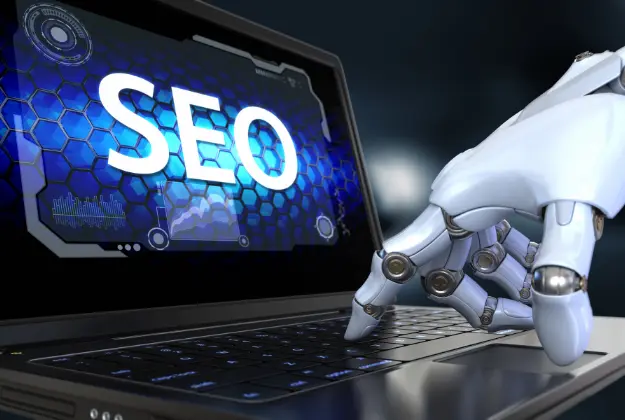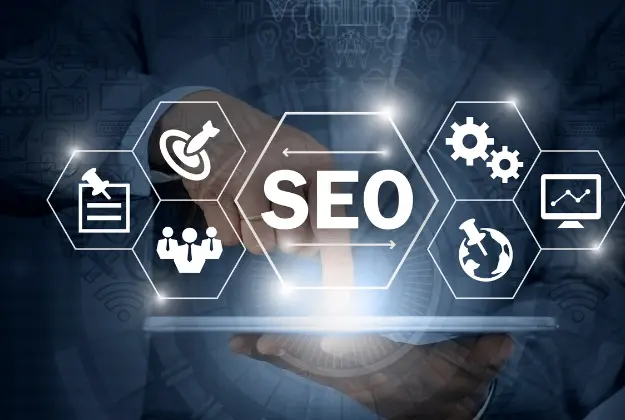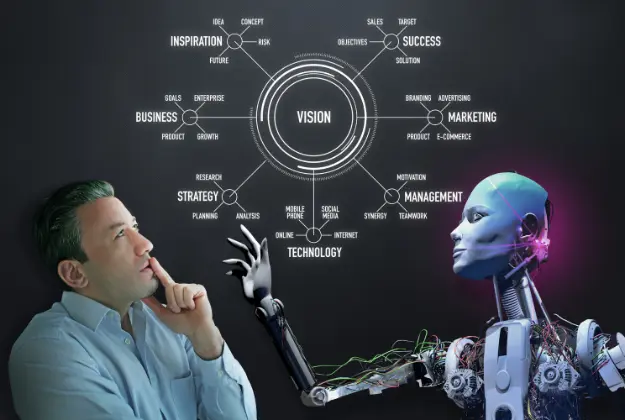MarketingSEO
Search Engine Optimization is no longer just about keywords and backlinks. According to HubSpot’s 2024 AI in Marketing report, 74% of the marketers now use at least 1 AI tool in their daily work, a sharp increase from just 35% last year. As AI adoption surges, the SEO industry is undergoing a major transformation. From content creation and keyword clustering to predictive analysis and real-time optimization, AI SEO is changing how brands approach online visibility. With Google rolling out AI-powered updates, traditional SEO updates are giving way to smarter, faster, and more adaptive strategies.
This article breaks down how AI is reshaping SEO—and what that means for your strategy moving forward.
The Role Of AI In Shaping The Future Of SEO
Artificial Intelligence is no longer a supporting tool for SEO, it is becoming a central part of how search engines understand, evaluate, and rank content. From Google algorithm updates like RankBrain, BERT, and MUM, to the rollout of the Search Generative Experience (SGE), AI and SEO are becoming inseparable.
At its core, Artificial Intelligence in SEO enhances Google’s ability to interpret user intent, not just keywords. It analyzes context, language patterns, entities, and behavioral data to deliver more personalized and accurate results. This evolution marks a significant shift in SEO and AI integration—where optimization strategies must adapt to how machines “understand” content.
For businesses, the future of SEO with AI means moving beyond outdated practices like keyword stuffing and link farming. Instead, success lies in leveraging AI SEO strategy—focused on creating content that aligns with user intent, semantic relationships, and technical performance.
Key areas where AI tools for SEO are shaping the landscape:
– Semantic Search
AI helps interpret natural language, improving relevance and intent matching in results—an essential part of artificial intelligence search engine optimization.
– Content Quality Evaluation
Algorithms can now measure readability, originality, and authority—pushing marketers to invest in higher-value content.
– Predictive Analytics
With new SEO technology, AI models forecast what content will perform well based on real-time trends and historical data.
– Automation
Repetitive SEO tasks like site audits, internal linking, and tag optimization are increasingly handled by smart tools.
As AI continues to evolve, AI SEO optimization will become the norm, not the exception. Whether it’s voice search, visual results, or personalized SERPs, AI and the future of SEO are deeply connected.
Traditional SEO vs AI-Driven SEO

As AI becomes more integrated into search engines and marketing tools, the gap between traditional SEO and AI-driven SEO continues to widen. While traditional SEO relies on manual input, rules-based processes, and static optimization, AI SEO strategies are built around automation, intent-based targeting, and real-time data adaptation.
| Traditional SEO |
AI-Driven SEO |
| Manual keyword research |
AI-powered keyword clustering and topic modeling |
| Static on-page optimization |
Dynamic content updates based on performance insights |
| Focus on exact match keyword |
Focus on semantic relevance and user intent |
| Human-written meta tags and descriptions |
Automatically generated and tested meta content |
| Backlink quantity emphasized |
Contextual link relevance and authority prioritized |
What AI SEO Means For Your SEO Strategy In 2025 And Beyond?
AI and SEO are no longer separate conversations. Moving forward, your success in search will depend on how well you can blend human insight with machine intelligence. AI SEO strategy is about more than just automation—it’s about making smarter decisions at every step, from keyword research to competitor analysis.
In 2025 and beyond, AI SEO optimization will be essential for staying ahead of algorithm changes. Google’s search engine is now powered by artificial intelligence itself, which means traditional tactics are being replaced with new SEO technology focused on user intent, contextual relevance, and real-time data. Tools driven by artificial intelligence in SEO will help you forecast rankings, generate adaptive content, and scale your optimization efforts with precision.
To compete effectively, marketers will need to invest in AI tools for SEO that offer automation without sacrificing strategy. The future of SEO with AI will be about agility—quickly analyzing trends, adapting to SERP changes, and creating content that aligns with both search engine signals and user behavior.
Will SEO Exist In The Next 5 To 10 Years?

Yes, SEO will absolutely exist, but it won’t look the same. The future of SEO will be shaped by continuous innovation, especially as Artificial Intelligence Search Engine Optimization becomes more sophisticated. While the core idea of helping people find relevant information won’t change, the tactics and tools will certainly change.
Instead of obsessing over keywords and backlinks alone, the incoming years will be all about high-quality, intent-driven content powered by AI. Search engines will rely more on machine learning to personalize results, filter misinformation, and prioritize user satisfaction. That means marketers who ignore the evolution of AI and SEO will fall behind.
Final Thoughts On AI SEO
AI is transforming the way SEO works, but it’s not making it irrelevant—it’s making it smarter. From keyword research to predictive analytics, AI is helping marketers work more efficiently and make better decisions. But the core of SEO remains the same: understanding what users are looking for and delivering content that meets those needs.
Looking ahead, success will come from blending AI-powered insights with human creativity and strategy. The future of SEO isn’t about choosing between AI and people—it’s about how well they work together.




32 Comments
Sarina Kassulke
17th August 2025Somebody essentially lend a hand to make significantly articles Id state That is the very first time I frequented your website page and up to now I surprised with the research you made to make this actual submit amazing Wonderful task
Chaya Murazik
18th August 2025helloI like your writing very so much proportion we keep up a correspondence extra approximately your post on AOL I need an expert in this space to unravel my problem May be that is you Taking a look forward to see you
Vivianne Schiller
18th August 2025I just could not depart your web site prior to suggesting that I really loved the usual info an individual supply in your visitors Is gonna be back regularly to check up on new posts
Rashawn Doyle
19th August 2025I just could not depart your web site prior to suggesting that I really loved the usual info an individual supply in your visitors Is gonna be back regularly to check up on new posts
Rod O'Conner
19th August 2025My brother suggested I might like this blog He was totally right This post actually made my day You can not imagine simply how much time I had spent for this info Thanks
Maurice Ortiz
19th August 2025Your writing is like a breath of fresh air in the often stale world of online content. Your unique perspective and engaging style set you apart from the crowd. Thank you for sharing your talents with us.
Noemi Adams
20th August 2025Your blog is a breath of fresh air in the often stagnant world of online content. Your thoughtful analysis and insightful commentary never fail to leave a lasting impression. Thank you for sharing your wisdom with us.
Josianne Swaniawski
22nd August 2025Its like you read my mind You appear to know so much about this like you wrote the book in it or something I think that you can do with a few pics to drive the message home a little bit but other than that this is fantastic blog A great read Ill certainly be back
Maeve Rutherford
22nd August 2025Your writing has a way of resonating with me on a deep level. I appreciate the honesty and authenticity you bring to every post. Thank you for sharing your journey with us.
Kariane Torp
22nd August 2025I was recommended this website by my cousin I am not sure whether this post is written by him as nobody else know such detailed about my trouble You are amazing Thanks
Joaquin Lindgren
22nd August 2025Thank you for the auspicious writeup It in fact was a amusement account it Look advanced to more added agreeable from you By the way how could we communicate
Millie Gusikowski
23rd August 2025Hi Neat post There is a problem along with your website in internet explorer would test this IE still is the market chief and a good section of other folks will pass over your magnificent writing due to this problem
Local Roofers in Concord
23rd August 2025This was well worth the read.
Concord Roofers by COncord NC
23rd August 2025Keep up the great work!
commercial roofing in Concord NC
23rd August 2025It’s always nice reading your work.
trusted roofing experts in Concord
23rd August 2025I’ve been following your blog for a while and I must say, your content never disappoints.
Concord NC Roofing Experts
24th August 2025I’ll definitely check back for more.
Kimberly Bauch
26th August 2025Your writing is a true testament to your expertise and dedication to your craft. I'm continually impressed by the depth of your knowledge and the clarity of your explanations. Keep up the phenomenal work!
Tressa Stokes
28th August 2025Your writing is not only informative but also incredibly inspiring. You have a knack for sparking curiosity and encouraging critical thinking. Thank you for being such a positive influence!
Margarett Stamm
28th August 2025Your writing is like a breath of fresh air in the often stale world of online content. Your unique perspective and engaging style set you apart from the crowd. Thank you for sharing your talents with us.
Dixie Lynch
28th August 2025Your blog is a constant source of inspiration for me. Your passion for your subject matter shines through in every post, and it's clear that you genuinely care about making a positive impact on your readers.
Abbie O'Keefe
28th August 2025What i dont understood is in reality how youre now not really a lot more smartlyfavored than you might be now Youre very intelligent You understand therefore significantly in terms of this topic produced me personally believe it from a lot of numerous angles Its like women and men are not interested except it is one thing to accomplish with Woman gaga Your own stuffs outstanding Always care for it up
Pansy Hyatt
28th August 2025Your articles never fail to captivate me. Each one is a testament to your expertise and dedication to your craft. Thank you for sharing your wisdom with the world.
Gregory VonRueden
28th August 2025Nice blog here Also your site loads up very fast What host are you using Can I get your affiliate link to your host I wish my site loaded up as quickly as yours lol
Myrtice Koelpin
28th August 2025Thank you for the good writeup It in fact was a amusement account it Look advanced to far added agreeable from you However how could we communicate
Melissa Mayer
29th August 2025Your writing is a true testament to your expertise and dedication to your craft. I'm continually impressed by the depth of your knowledge and the clarity of your explanations. Keep up the phenomenal work!
Reagan Wiza
29th August 2025helloI like your writing very so much proportion we keep up a correspondence extra approximately your post on AOL I need an expert in this space to unravel my problem May be that is you Taking a look forward to see you
Larue King
29th August 2025Your blog is a beacon of light in the often murky waters of online content. Your thoughtful analysis and insightful commentary never fail to leave a lasting impression. Keep up the amazing work!
Jordyn Bayer
29th August 2025I do believe all the ideas youve presented for your post They are really convincing and will certainly work Nonetheless the posts are too short for novices May just you please lengthen them a little from subsequent time Thanks for the post
vorbelutrioperbir
1st September 2025I am really inspired along with your writing skills as smartly as with the structure in your blog. Is that this a paid theme or did you modify it yourself? Either way keep up the nice quality writing, it’s uncommon to look a nice blog like this one today..
Keven Felber
7th September 2025Hi, just required you to know I he added your site to my Google bookmarks due to your layout. But seriously, I believe your internet site has 1 in the freshest theme I??ve came across. It extremely helps make reading your blog significantly easier.
Watch NBA Online
9th September 2025Some genuinely interesting info , well written and generally user friendly.